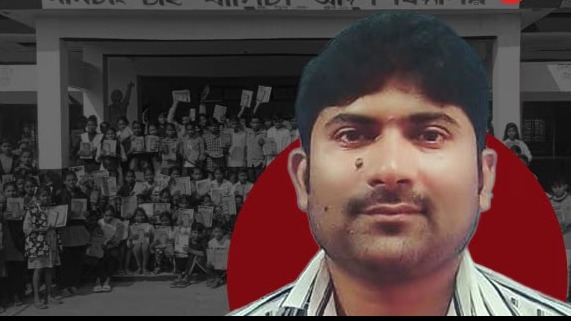150 km a day through elephant country: Assam teacher’s journey that won him the National Teachers’ Award
By | Education | 05-Sep-2025 15:47:21

News Story
Every dawn, when the first light spills over Assam’s sprawling tea gardens,
34-year-old Debajit Ghosh begins a journey few would dare to undertake. Nearly
150 kilometres of rough, unpredictable roads lie ahead, cutting through the
wild expanse of Dihing Patkai National Park, where elephant crossings can turn
deadly and rains often turn paths into quagmires.
Yet, for Ghosh, the daily ordeal is not an
obstacle but a calling. His destination: Namsang Tea Garden Adarsha School in
Upper Assam — a school that has rewritten the fate of children from tea garden
communities, many of whom once dropped out after the primary level.
On Thursday, his grit and vision were
recognised on the biggest stage. Ghosh stood among 45 teachers from across
India as President Droupadi Murmu honoured him with the National Teachers’ Award 2025 — a
recognition not just of his teaching, but of a life dedicated to changing an
entire community’s relationship with education.
From Dibrugarh to the tea gardens: a journey
of resolve
Why continue living in Dibrugarh, despite the
punishing commute? Ghosh’s answer is simple: responsibility. His wife works in
the city, official paperwork requires frequent trips, and his car often ferries
two other teachers who otherwise have no access to the school. “If I don’t take
this road, the school’s work will suffer,” he says with quiet conviction.
That sense of duty has transformed Namsang Tea
Garden Adarsha School since its establishment in 2022. For the first time,
children from the tea gardens — long denied secondary education due to the
absence of nearby high schools — had a classroom within reach. The results were
immediate. From 271 students in its first year, enrolment rose to 326 the next.
Dropouts declined sharply. Pass percentages soared.
A teacher who goes beyond textbooks
For Ghosh, teaching has never been confined to
chalk and syllabus. In his classroom, science is taught through toy-making,
anatomy through 3D websites, and curiosity through hands-on experiments. “If
you deliver monotonous lectures, students will never listen,” he says. “But if
you let them see, touch, and do, they learn with joy.”
His compassion stretches outside classrooms
too. A health camp he organised under the Rashtriya Bal Swasthya Karyakram
revealed most of his students suffered from low haemoglobin. He ensured
treatment, tracked progress, and watched anaemia levels in the community
decline.
He also took on one of rural education’s
toughest battles: dropouts. Over three years, he brought 267 children back into classrooms,
convincing parents who once saw schooling as secondary to plantation work.
Today, many of those children are pursuing higher studies — some even dreaming
of research careers.
A story of impact — and unfinished battles
What defines Ghosh is not just perseverance
but empathy. He recalls the story of Abhishek, a Class 8 student who disliked
writing and was failing in science. Instead of giving up, Ghosh introduced oral
assessments, built his confidence, and mentored him relentlessly. Abhishek went
on to score 100 in Science in his matriculation exam and is now pursuing a PhD
in Mathematics.
But challenges remain. Rising transportation
costs strain him. The school, though equipped with a lab and a library, lacks a
sports teacher. “A school in the plains and one in the hills cannot function
with the same grant,” he says candidly.
Even as he reflects on the award, his gaze
stays fixed on the future: “I want to be remembered not only as a teacher but
as a mentor who stood by his students when it mattered most.”
For the children of Assam’s tea gardens, that is already true. And for a nation celebrating its teachers, Debajit Ghosh’s story is proof that one determined educator can move mountains — even if it means driving 150 kilometres through elephant country every single day.